Team Experience has been celebrating Doris Day for her Centennial.
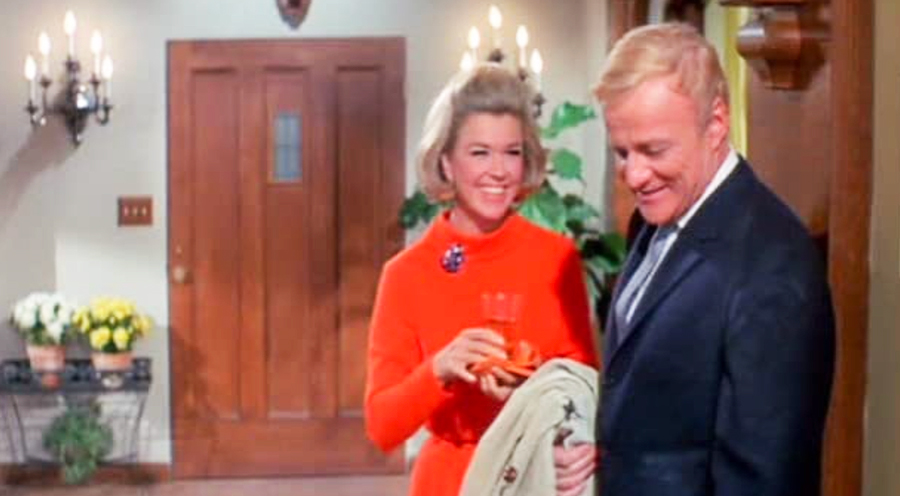
by Nathaniel R
Most careers peter out. Not so with Doris Day's. The most bankable actress of the first half of the 1960s chose to wrap it up at the first real sign that her popularity was waning. Her last top ten of the year hit was the bizarre comedy The Glass Bottom Boat (1966) but her last film, a blended family comedy called With Six You Get Eggroll (1968), was also a hit albeit not as big as her usual successes. The 1960s were tumultuous on all fronts including ideas about sexuality. The media became snide about Day, infamously dubbing her "The World's Oldest Virgin".
In retrospect, with only anecdotal history to go on, it's fascinating that Doris Day was supposedly rejected on these grounds when Julie Andrews, the box office queen of the second half of the 1960s, was not exactly a repudiation of the Day persona; sunny, funny, wholesome, short-haired musical blonde whose chemistry with male co-stars was undeniable but hardly horny...

The 1970s were on the way and a new wave of stars including Jane Fonda, Julie Christie, Faye Dunaway, Catherine Deneuve, Barbra Streisand, who were all exploding in the back half of the 1960s would be a truer about face. These actresses were sexually charged, exuded intelligence, and were sometimes thorny and confrontational onscreen. Mark Harris's classic Oscar book "Pictures at a Revolution" insightfully cites Natalie Wood as an actress that was the exact right age to be "New Hollywod" but was actually Old Hollywood through and through. In a way, though, we think of Liz Taylor as the bridge between the Hollywoods, or rather the prophesy of one era giving way too another. Taylor was always Too Much (part of her appeal, naturally) too sexy, too controversial, too heightened, too defiant for her heyday. The best insult that's actually a compliment ever was the Vatican damning her for her "Erotic Vagrancy" in the early 1960s. Her persona, if not quite her intense glamour, fits smoothly into the 1970s if you think about it.
But back to Doris, whose centennial is this very day!
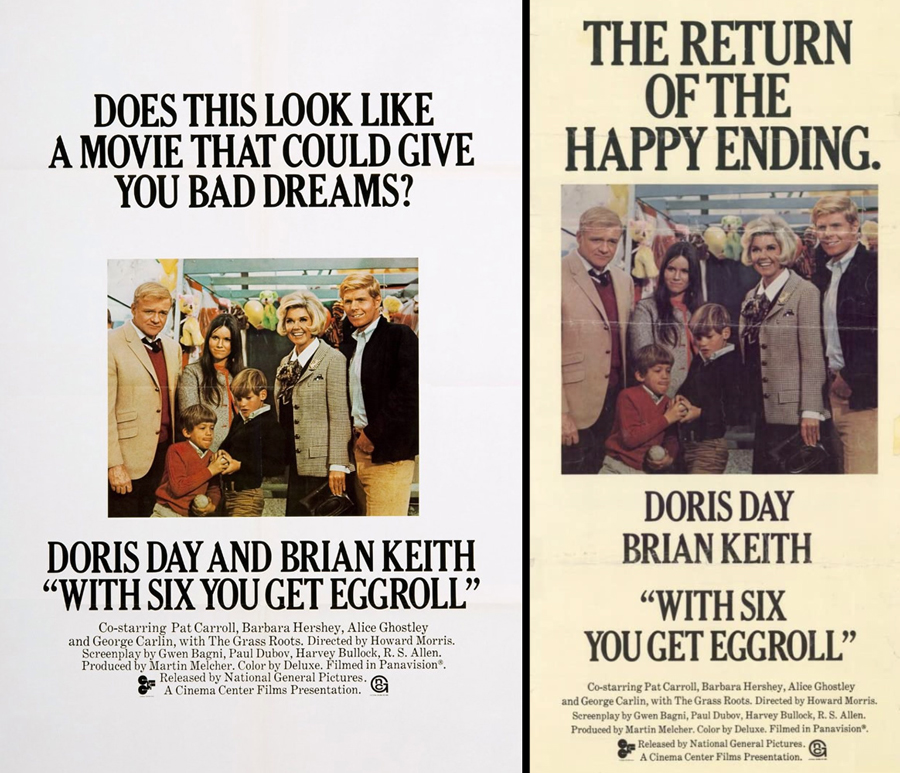 Look at the crazy mixed messaging from the taglines !!! Is this a cringe comedy or a feel-good comedy?
Look at the crazy mixed messaging from the taglines !!! Is this a cringe comedy or a feel-good comedy?
While the culture around the movies and movie stars was rapidly changing, cinema is always a few years behind major turns. It takes time for movies to get made and for a behemoth dream factor to notice that the times have already changed. Still, it's not strictly true that Day was passé by the late 60s, since her films were still popular and they do reflect the changes that were happening, if a Disneyfied version of them. We use Disneyfied figuratively here since her final film at 46 years of age, With Six You Get Eggroll (1968), came from the now forgotten studio National General Pictures (whose library was bought by Warner Bros in the 1970s).
With Six You Get Eggroll is a essentially a romantic comedy which morphs into a family comedy by the end. It's about a widow (Doris Day) who is mother to three sons who begins a romance with a widower (Brian Keith) who has one daughter (future Oscar nominee Barbara Hershey's film debut at 20). The middle age singles.liked each other (platonically!) before their spouses died and when they meet again several years later they hit it off. Their whirlwind romance doesn't go over well with their children and the second half of the picture is mostly them deaing with the fallout of trying to blend their families.
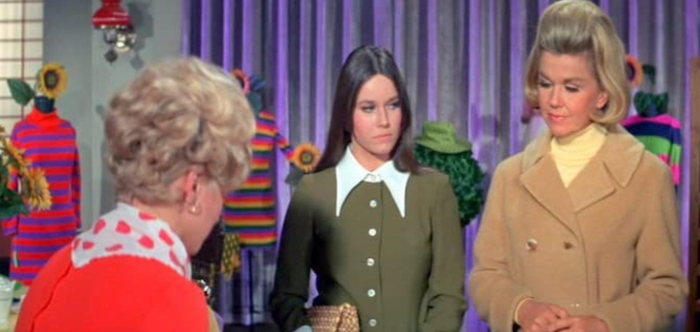 Barbara Hershey in her film debut (!) gets prickly with her dad's girlfriend Doris Day
Barbara Hershey in her film debut (!) gets prickly with her dad's girlfriend Doris Day
You can see the DNA of many of the RomCom and MomCom queens that came after Day in her winning performance which exhibits quite a lot of range given the material. There's a lot of Meg Ryan's sunny but wistful cuteness, a bit of Diane Keaton or Terri Garr's frazzled energy (but as rare flourish rather than baseline), some of Sally Field's earnestness, a tiny pinch of both Julia Roberts tartness and Reese Witherspoon's girlboss formidability, and a huge heap of Sandra Bullock's effortless charisma with acting choices that alternate between broad and so minimalist that you wonder, in the latter case, if she's doing anything at all and then you find yourself completely won over anyway. It's an endearing magic trick. What's more, as history proves, skill at Romantic Comedy is a very specific gift that not every movie star actress has.
Day has a lot of fine moments in this initially grounded comedy that grows increasingly sillier as it goes.The story arc is easy to see coming, but Day (and the always reliable if less movie-star dazzling Brian Keith) make a winning team. Day varies it up scene-to-scene with multiple colors to her moods. She gives this widow a full personality but doesn't let this clutter but rather assist and inform the punchlines. Her skillfull work also accounts for the dramatic undertow of two lonely people who are happy to have found each other but aggravated and even a little impatient with the children don't share their happiness.
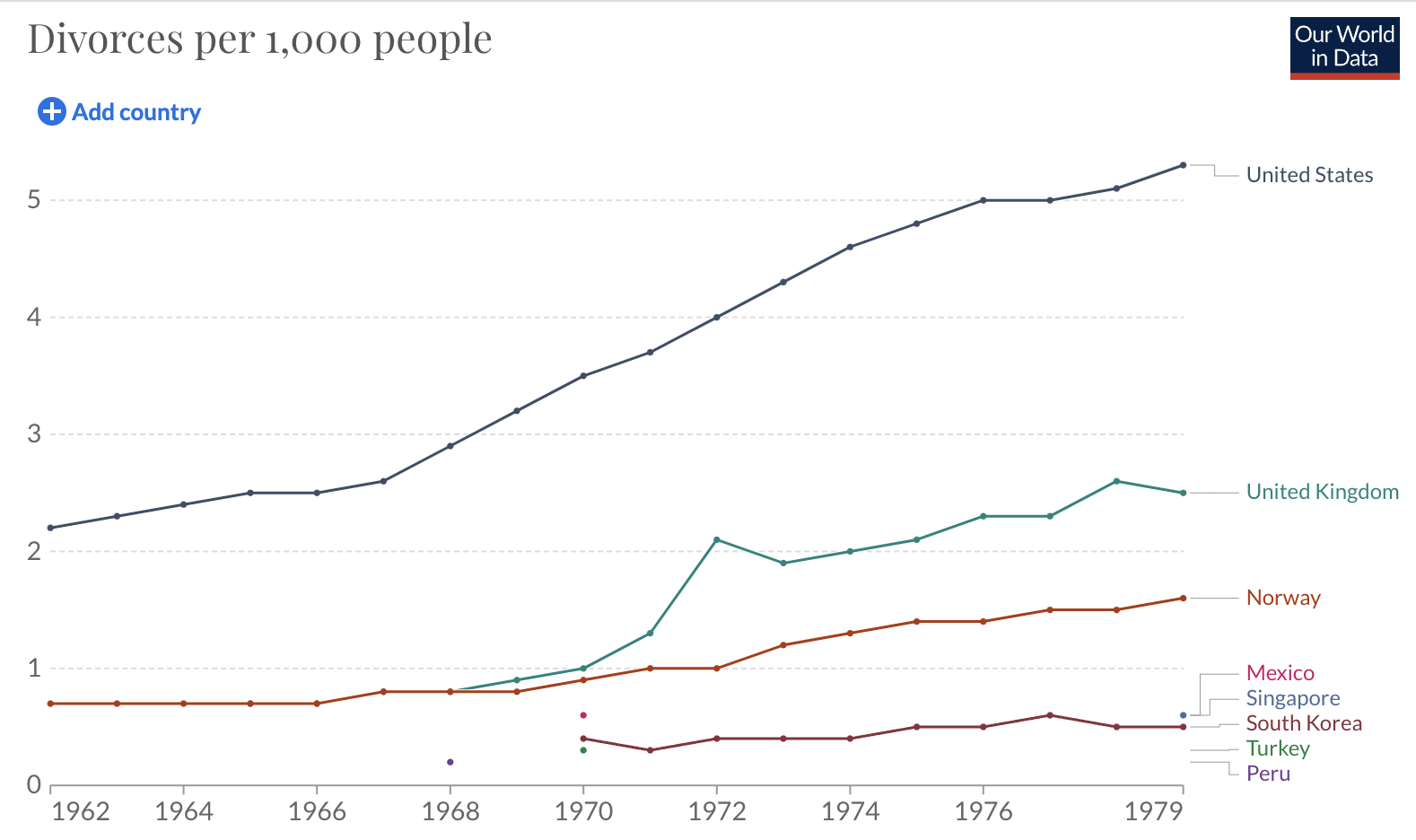 Divorce rates climbed all throughout the 1960s and 1970s, peaking by 1979-1981
Divorce rates climbed all throughout the 1960s and 1970s, peaking by 1979-1981
1968 and 1969 are a really interesting couple of years for movies and TV in terms of depicting romance and families. The movies begin to reflect new American realities. Blended families, which you never see in earlier movies, were suddenly a topic. Divorce began to skyrocket in the mid 1960s and didnt level off until the 1980s. The movies sanitize the new cultural eality so that both parents are widowed rather than divorced but the end result is the same.
With Six You Get Eggroll had the misfortune to open a few months after Yours Mine and Ours, a Lucille Ball comedy which is also about a widow and widower hitting it off and blending their (very large) families. Yours Mine and Ours was a big hit so Eggroll had to settle for runner up status but it was a success, too. One year later the sitcom The Brady Bunch would premiere on television (though it was already in the works before those two pictures were released) as the first sitcom about blended families. The only "update" to the sudden trend within the seminal sitcom was that Mrs Brady's former marriage was never addressed. This was a compromise because the creator of the show wanted her to be a divorcée and the network wanted her to be a widow (less controversial!) and they could never come to an agreement.
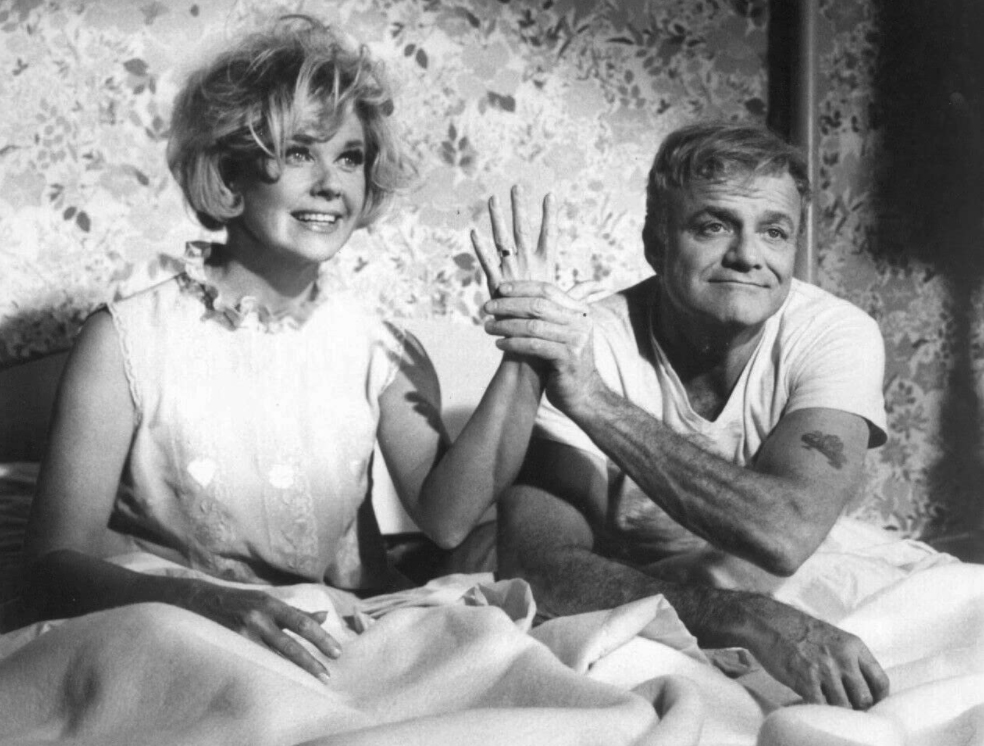
Now about that infamous 'Worldest Oldest Virgin' tag. We've always thought it overblown and unfair since Day's films were just following the social norms of movies at the time. The only trouble was that her star persona wasn't complicating or counteracting that the way some of her peers at the time did; Shirley Maclaine, Natalie Wood, and especially Sophia Loren and Elizabeth Taylor gave off sexual-being vibes even in the cases when individual films were sexless. But projecting sexlessness on to Day isn't accurate either. Day often had chemistry with her romantic co-stars. And she and Keith have believable sexual chemistry in With Six You Get Eggroll whether they're just looking too intently at each other or embracing. There's even the hoary gag of a champagne bottle pop suggesting an orgasm (Keith makes a mess all over Day) which is immediately followed by the stars cuddling by the fire in seeming post-coital bliss. In one really funny line delivery late in the movie Day destroys a too-flirtatious neighbor who is after her new husband.
In fact, compared to mainstream family movies of the 2020s With Six You Get Eggroll is comparatively horny. Day and Keith are always sneaking off to spend time together. We even see them in bed together. In one chaotic scene Day's boys discover a man in her bed. Day sheepishly flashes her new wedding ring as punchline (the new couple has just eloped). In the end, this was still an innocent Doris Day comedy but it's a good one to cap off a legendarily sunny career.
previously
The Man Who Knew Too Much (1956)
Pillow Talk (1959)